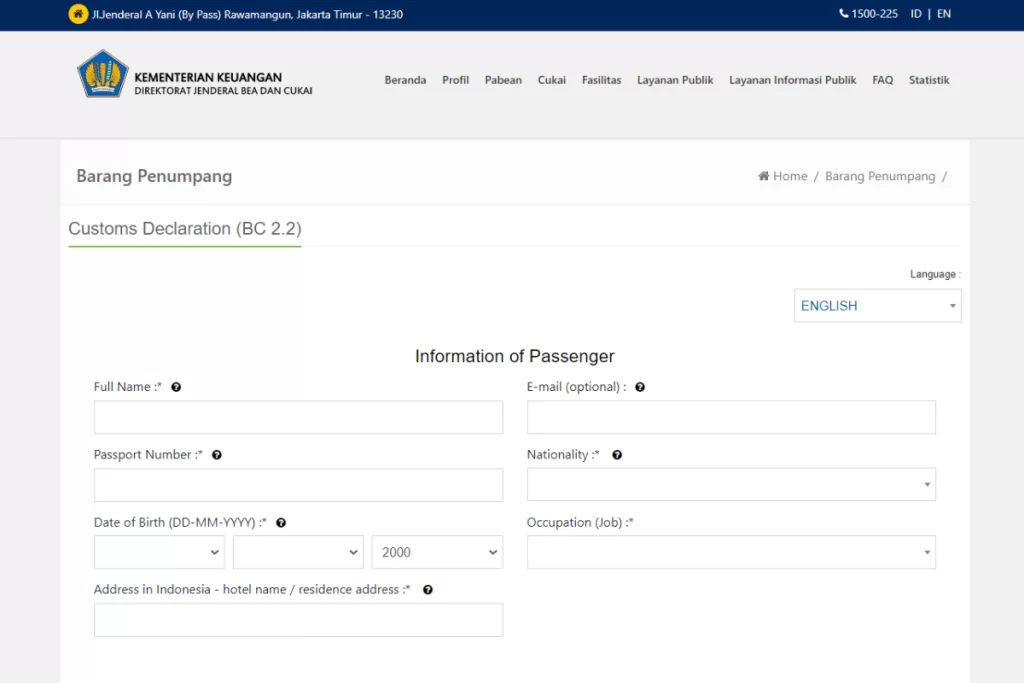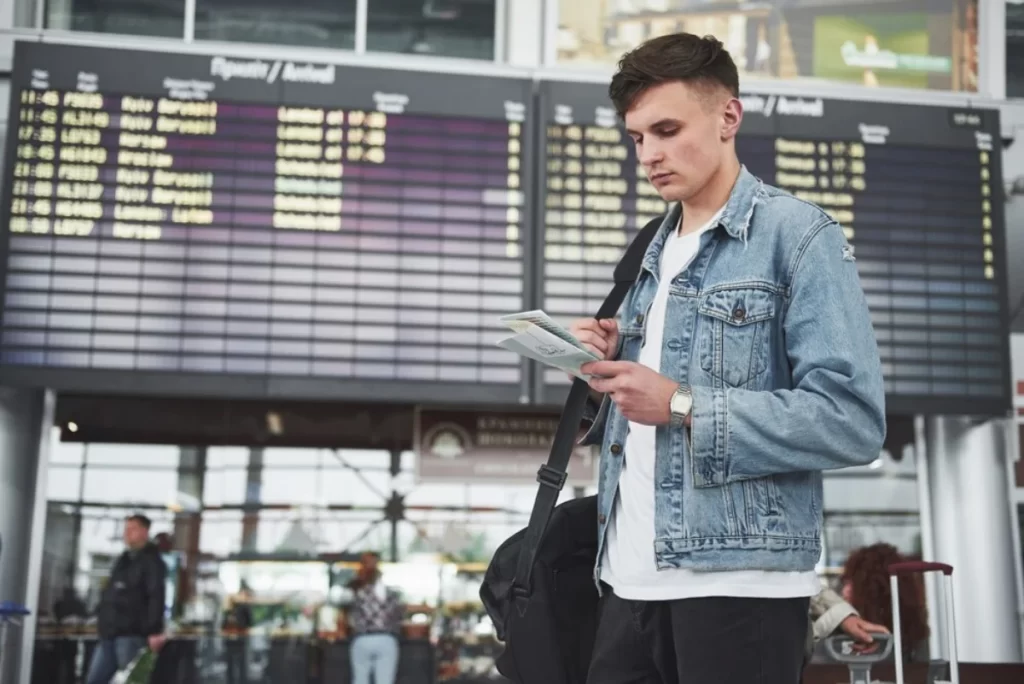Bali is a captivating Indonesian island consistently ranks amongst the world’s top tourist destinations, and for good reason. From its breathtaking landscapes and world-class diving to its rich artistic traditions and mouth watering cuisine, Bali offers something for every traveller.
However, among the excitement of planning your dream Bali getaway, one crucial detail deserves your undivided attention: customs regulations. Understanding what you can and cannot bring into the country is essential for a smooth and hassle-free arrival. This guide will equip you with all the necessary information to navigate Bali customs with confidence, ensuring your island adventure begins on a positive note.
Table of Contents
ToggleCustoms Made Easy: A Step-by-Step Guide for Visitors
Arriving in Bali shouldn’t be stressful. Here’s a breakdown of the customs process to ensure a smooth entry:
1. Complete the Electronic Customs Declaration (ECD) Form

The ECD is an online form that details the items you’re bringing into Indonesia. You can complete it online up to 3 days before your arrival. Be sure to declare everything accurately to avoid any delays, including all your belongings, even personal items like medication, food, drinks, and any money you’re carrying. The QR code from the filling results will appear in your email or can be downloaded directly to be shown to Customs and Excise officers in the Bali airport.
Why do you need to declare? Think of everything you bring as imported goods. Indonesia has restrictions on certain items, and some might require special permission. On top of that, some imported goods can be taxed.
Head to the official website for Indonesian ECD form here : https://ecd.beacukai.go.id/
2. Head to Customs Area at International I Gusti Ngurah Rai Airport
Upon arrival, after passing the immigration gate to get your passport stamped and obtaining your baggage, follow the signs directing you to the customs area to declare all the goods you bring into Bali. If you have items to declare, have your completed ECD form and any relevant receipts readily available, also be prepared for a potential customs inspection. Here, officials might ask to see your belongings to verify your declaration.
3. Follow The Procedure and Answer Truthfully
Should the customs officials ask any questions regarding the declaration, answer truthfully and politely to avoid any delays and make sure everything is running smoothly. Also, make sure to organize your belongings for easy inspection as this would save everyone’s time.
After everything has been checked and all is good, you may now officially start your balinese adventure!.
What to Declare at Bali Customs
When it comes to Bali customs. permitted goods usually still have some limitations, and prohibited goods are completely banned. If you accidentally or intentionally break the rules, you will be fined accordingly. Note that personal goods for passengers include items used for personal purposes, as well as remaining supplies.

Electronics
You are permitted to bring electronics such as mobile phones, laptops, tablets, and drones, with a maximum of two items per person as stipulated by the Ministry of Trade. You must also complete a declaration for device IMEI registration on the ECD form.
- Short Stays (less than 90 days): If your stay in Indonesia is less than 90 days, you do not need to worry about this declaration.
- Longer Stays (more than 90 days): If you are staying longer than 90 days, you must declare any cell phones, tablets, or other devices that use a SIM card. Failure to do so will result in your devices no longer supporting a local SIM card after 90 days.
Additionally, if any of your devices are valued at over $500, you will be required to pay an import tax on each device. Customs will determine the value, typically reflecting the current market price.
Foods & Beverages
Certain foods and beverages are restricted or prohibited for passengers bringing goods into Bali from abroad, including:
- Alcoholic beverages: Limited to 1 liter per adult passenger (21 years and older).
- Cigarettes: Limited to 200 cigarettes, 25 cigars, 100 grams of sliced tobacco, or other tobacco products (18 years and older).
- Raw food (vegetables, fruits, seeds, and meat): Requires permission from Quarantine authorities in the country of origin and Indonesia.
Please note that goods of quarantine concern, such as animals, fish, and plants, must have quarantine permissions from both the country of origin and Indonesia. Or else they cannot pass.
Medicine
Personal medicine must be declared in the Customs Declaration. It is highly recommended to carry the doctor’s prescription with the exact dosage or amount prescribed. Be aware that medicines containing forbidden narcotics or marijuana are strictly prohibited and will be confiscated and might land you in trouble with the authorities and potentially jail time.
New Clothing
Up to 10 pieces of new clothing per person are allowed, according to the Ministry of Trade. Ensure these items are for personal use, not for sale. Exceeding this limit may result in your items being classified as commercial goods. It’s a good idea to pack light anyway, on the other hand, if you want to go on a shopping spree on bali, there are a lot of best places in Bali for shopping that would be suitable for you.
Cash Money
Please be cautious when carrying cash. Any passenger bringing more than Rp 100,000,000 (approximately USD 7,000) from abroad is REQUIRED to declare it in the Customs Declaration (CD Form). Failure to declare it will result in an administrative penalty of 10% of the cash amount, in accordance with Indonesia Ministry of Finance Regulation Number 100 of 2018.
Luxury Items
Luxury items like bags and jewelry may be flagged by customs officials as potential items for sale. To avoid this, limit the quantity and ensure they are clearly for personal use only. Excessive amounts could lead to additional scrutiny and possible taxation.
Unaccompanied Baggage
Unaccompanied baggage refers to passengers’ goods that arrive before or after the passenger, under the following conditions:
- The goods must arrive within 30 days before the passenger’s arrival or no later than 15 days after the passenger’s arrival.
- The sender and recipient must be the same person, as indicated on the passport.
- The boarding pass or ticket and passport with an immigration stamp must be presented to validate the passenger’s arrival.
- New goods found inside the baggage are subject to tax.
As a general rule of thumb, it’s advisable to declare everything you bring into bali in the aforementioned ECD form. Double check your baggage before your flight to bali and make sure everything is declared in the ECD form to avoid any inconvenience during your arrival customs process.
Forbidden Goods in Bali Customs

Narcotics & Drugs
This is an extremely serious matter. Importing narcotics into Indonesia can result in the death penalty or long-term imprisonment, depending on the circumstances. This includes medication containing marijuana, so keep that in mind. If it is proven in court that the narcotics were for personal use rather than for sale, the penalties may differ, but they are still severe. Travelers are strongly advised not to accept items from strangers and to personally pack their luggage to ensure they know its contents.
Goods Intended for Sale
Items that are clearly intended for sale are prohibited. This includes goods in packed cardboard boxes, which will be assumed to be for commercial purposes. Travelers should ensure their luggage only contains personal items to avoid complications.
Pornographic Films, Images, or Items
Any films, images, or items containing elements of pornography are strictly forbidden. Indonesian law prohibits the importation of any material deemed pornographic, and violators can face severe legal consequences.
Firearms and Imitations
Firearms, regardless of their intended use, are prohibited. This also includes imitation firearms, which are not allowed under any circumstances. The importation of these items is heavily restricted to maintain public safety and security.
Ammunition
The importation of ammunition is strictly forbidden. Any attempt to bring ammunition into Bali can result in severe legal penalties, including confiscation and potential imprisonment.
Other Prohibited Items
Various other items are also restricted, including large quantities of plastic bags (beyond what is necessary for packaging), antique products, folk craft items, and other items with specific characteristics. These restrictions are in place to protect local industries and cultural heritage, as well as to maintain environmental standards. As a good rule of thumb it’s advised to be more eco-friendly while you’re in Bali.
When traveling to Bali, it’s crucial to be aware of the customs regulations to ensure a smooth entry into the country. By understanding what items need to be declared—such as luxury goods, new clothing, and electronics—you can avoid unnecessary fines and delays. Always pack your luggage personally and be cautious of accepting items from strangers. Adhering to these guidelines will help you enjoy your stay in Bali without any customs-related complications. Safe travels!
After you get through the airport and start your Bali holiday, pay us a visit at our restaurant in Pererenan, WOODS Bali. Dine in elegance surrounded by reclaimed wooden furniture, and your journey in the Island of Gods will start on a high note. Book your table today, and come enjoy what we offer at WOODS Bali!







